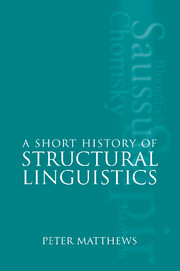2 - Languages
Published online by Cambridge University Press: 03 December 2009
Summary
Linguistics is said in dictionaries to be ‘the branch of knowledge that deals with language’ (New Shorter Oxford English Dictionary) or ‘the scientific study of language’ (Collins). But for structuralists it has been much more the study of, in the plural, languages. This was true at the outset, for Saussure, and is still true for many as we enter the twenty-first century. What then constitutes ‘a language’? It is easy to give examples: English is one, Japanese another, and so on. But what, in general, are they?
Let us look again at dictionaries. For the first editor of The Oxford English Dictionary (Murray et al., 1933 [1884–1928]), the earliest sense of ‘language’ (§1) was that of ‘the whole body of words and of methods of combination of words used by a nation, people, or race’; alternatively, ‘a tongue’. The dictionary itself was thus an account of the ‘whole body’ of words that constitute the lexicon of English. The second definition (§2) adds a ‘generalized sense’: ‘words and the methods of combining them for the expression of thought’. But where Murray saw a ‘body’, The New Shorter Oxford Dictionary speaks of a ‘system’. Language is ‘a system of human communication using words … and particular ways of combining them’; it is ‘any such system’, the definition adds, ‘employed by a community, a nation, etc.’ (§1a). In the Collins dictionary, it is ‘a system for the expression of thoughts, feelings, etc. by the use of spoken sounds or conventional symbols’ (§1); also in general (§2) ‘the faculty for the use of such systems’.
- Type
- Chapter
- Information
- A Short History of Structural Linguistics , pp. 5 - 30Publisher: Cambridge University PressPrint publication year: 2001
- 1
- Cited by



